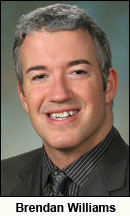OPINION
‘We’re not Wisconsin?’ No, arguably we are worse
Throughout the 2011 legislative session, cold comfort, and perhaps a smug relativism, was found in the statement, “We’re not Wisconsin.”
Indeed, as time passed even Wisconsin was no longer “Wisconsin” as the epitome of an anti-labor state government. Ohio, for example, went further by restricting collective bargaining for police and firefighters. Yet Wisconsin served as the reference point for Tea Party excesses. Regrettably, it, and similar states, was an incredibly-low bar against which to measure progress.But are we really not Wisconsin? Arguably we’re worse.
In Wisconsin, after all, Assembly and Senate Democrats stood up for workers. In Washington, where retreat is defined as progress, it was Democrats leading the charge to rescind worker rights.
Here both parties rolled over labor to enact legislation to begin dismantling our state’s century-old Industrial Insurance Act – effectively equating medical needs with Lotto scratch tickets. The cynical bet is workers, under economic duress, will sell short $550 million in workers’ compensation claims over the next four years.
Not needing to be in the majority to get his way, House Republican Leader Richard DeBolt exulted, “This is a great deal.”
“I’ve felt all along that I was negotiating for the worker” crowed anti-labor Representative Cary Condotta. The outcome was inevitable when, just two months after Initiative 1082 failed, Democrats conceded as gospel a message 60% of voters rejected; namely, that our workers’ compensation system was irretrievably broken.
For years some blocked homeowners’ rights legislation supported by most Democrats, and by 76% of Washingtonians in a 2008 Celinda Lake poll. And again this year we were told the Legislature needed to bend to the will of a conservative Democratic minority. What is it about Washington that makes it the nation’s most under-performing Democratic state?
Attacks on collective bargaining passed the Senate. One “pro-labor” senator excused the Senate’s unilateral teachers’ pay cut by equating it to a cut state workers bargained for in exchange for other considerations. A 10% cut in service hours for home care clients subverts caregivers’ bargaining rights.
Even Wisconsin Governor Scott Walker, while attacking Wisconsin workers’ civil rights, only proposed state workers pay roughly as much of their health care premiums as state workers here were already paying – 12.6%. After July 1, Washington state workers will pay 15% of premiums. Walker wouldn’t go that far.
But back when Walker was just a county executive, we had already imported Walker-style leadership for our most sensitive agencies.
The Department of Social and Health Services is charged with protecting our most vulnerable citizens, in addition to being state government’s largest unit. Since May 2009 it has been run by Wisconsin import Susan Dreyfus, who gave $2,000 to her friend Walker (she also gave $1,000 to John McCain for president).
The Department of Labor & Industries is charged with protecting workers. From 2005-2006 Gary Weeks was its director. After leaving for the private sector, he blamed workers for issues with the fund’s balance that arose during his tenure. In so doing, Weeks ignored the effects of an unsustainable 2007 rate cut he advocated for, in addition to errors that caused overpaying group retrospective rating program refunds.
Using his Democratic appointee credentials, Weeks promoted I-1082 and this year’s compromise-and-release legislation.
For years the state has pushed Republican dogma and advocated for health savings accounts (HSAs) for state employees, despite the fact that such high-deductible accounts, to quote Consumers Union, appeal to the “healthy and the wealthy” and can crowd out low-deductible plans. Cherry-picking defeats the ideals of universality behind federal health care reform.
Yet HSAs were embraced this session. As state employees feel pressed by wage concessions and increased health care premium costs, economic circumstances may effectively coerce them into a Hobson’s choice for which they are ill-suited — which may force medical bankruptcies.
What an amazing juxtaposition: In a year when Democratic Vermont enacts single-payer legislation, Washington enacts an element of far-right Jaime Herrera-Beutler’s first congressional speech, where, in calling for the repeal of “Obamacare,” she extolled “the expanded use of Health Savings Accounts.” In speeches defending his lawsuit against the federal health care law, Attorney General Rob McKenna touts HSAs.
This past session, we heard a constant legislative chorus, relative to closing tax breaks, of, “The people have spoken!”
Yet some only listen when Tim Eyman’s lips move along with the people’s. Some examples of citizen-passed initiatives where outcomes were ignored by the Legislature were: 728 (class sizes), 732 (K-12 pay), 901 (smoking ban), 1029 (long-term care training), and 1082 (workers’ compensation). End-runs were attempted to resurrect failed liquor-privatization initiatives 1100 and 1105.
Further, claims Eyman’s Initiative 1053 held the Legislature back on revenue were belied by the failure to muster simple majorities to preserve jobs through extending King County stadium taxes, or refer tax loophole closures to voters.
It’s learned helplessness. We’ve become captive to low expectations and transactional politics.
So what’s next? Majorities only matter if they’re qualitative, not just quantitative. Here’s hope: Eight idealistic labor-supported House Democratic freshmen voted no on the “structured settlement” workers’ compensation plan. They form a nucleus of hope for a better tomorrow. Going into 2012, labor must continue its “Don’t-Invest-In-More-Excuses” strategy of not being taken for granted.
Brendan Williams is a former State Representative from the 22nd Legislative District.






